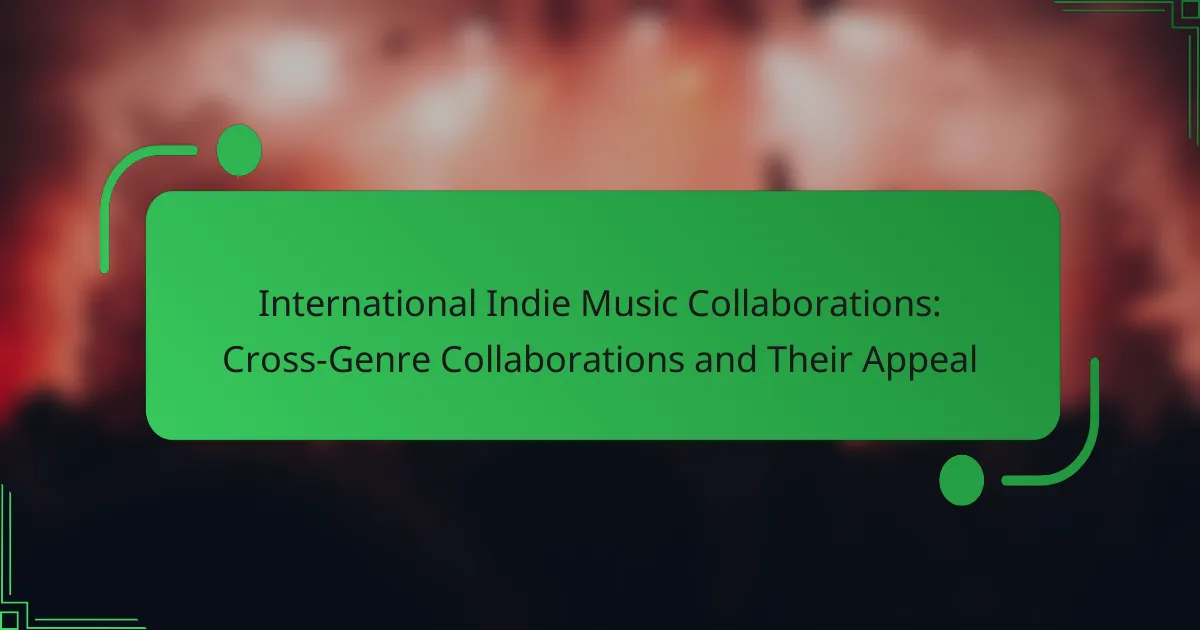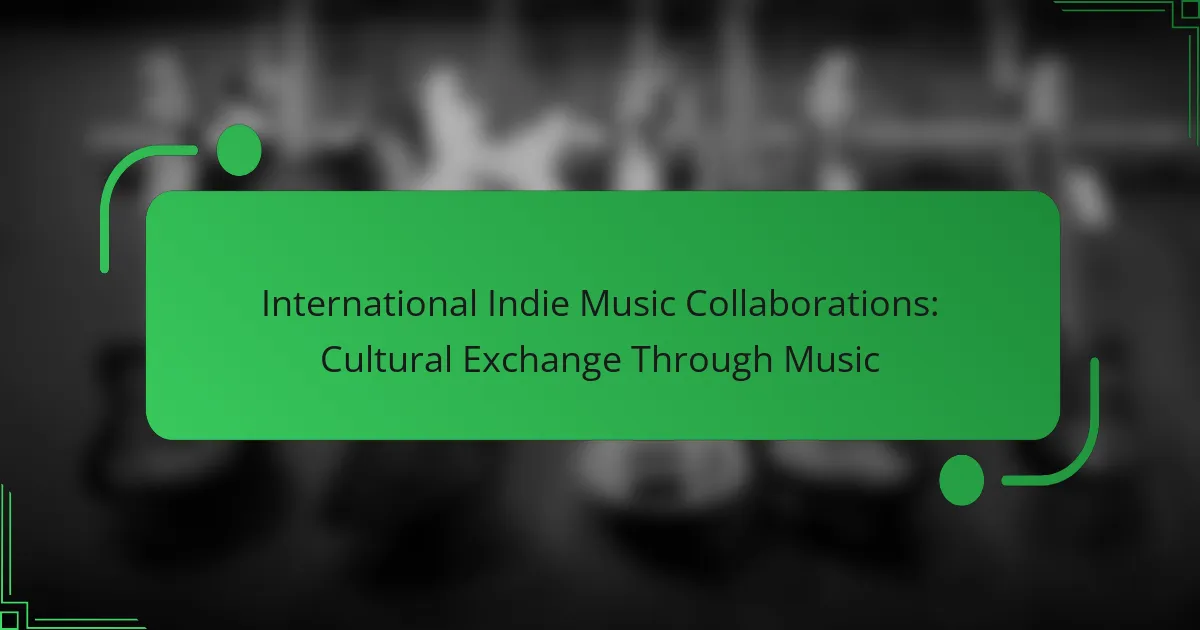Navigating international indie music collaborations involves complex legal considerations, particularly around copyright and contracts. Key factors include ownership rights, essential licensing agreements, and understanding diverse copyright laws. Collaborators must also address revenue sharing and cultural differences that influence agreements. Clear contracts and open communication are vital to overcoming potential legal challenges in cross-border partnerships.
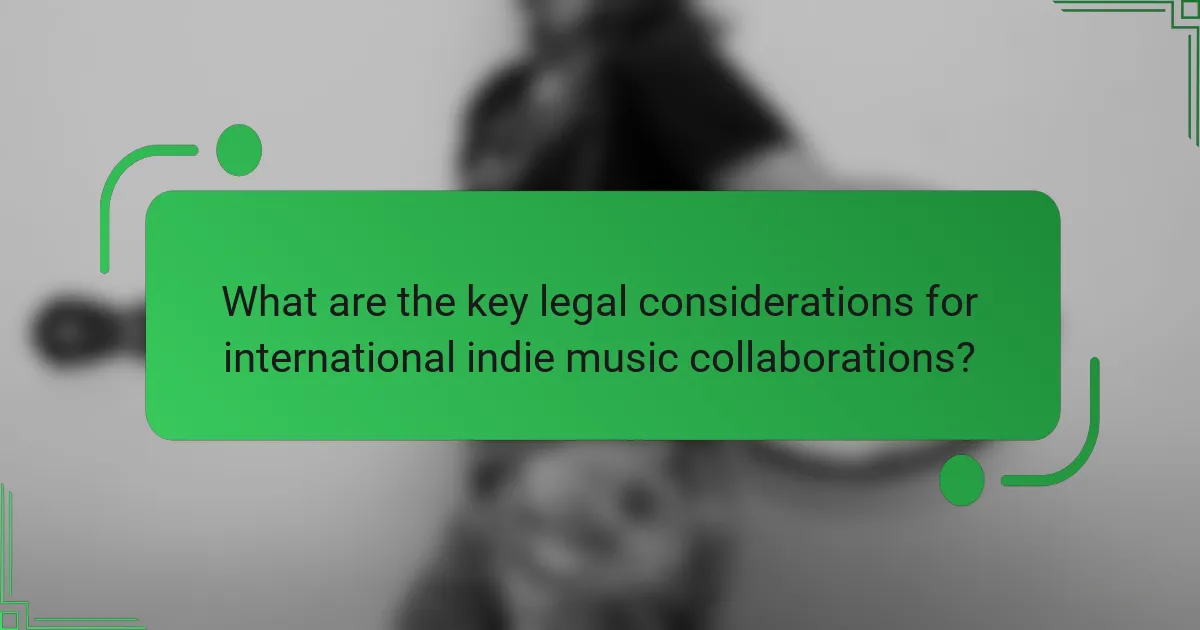
What are the key legal considerations for international indie music collaborations?
International indie music collaborations require careful attention to legal considerations, particularly regarding copyright and contracts. Key factors include defining ownership rights, ensuring proper licensing agreements, and understanding international copyright laws. Collaborators should also address revenue sharing and dispute resolution mechanisms in their agreements. Additionally, it is crucial to recognize the unique legal frameworks in different countries that may affect collaboration outcomes.
How do copyright laws vary across different countries?
Copyright laws vary significantly across countries, affecting international indie music collaborations. Different jurisdictions have unique frameworks that govern copyright duration, ownership, and enforcement. For instance, the United States typically grants copyright protection for the life of the author plus 70 years, while European countries often follow similar guidelines but may have additional moral rights. Additionally, some countries have more lenient rules regarding fair use, impacting how music can be sampled or reused. As a result, indie musicians must navigate these complexities to ensure compliance and protect their creative works effectively.
What are the implications of the Berne Convention on music collaborations?
The Berne Convention significantly impacts music collaborations by ensuring that creators retain copyright protections internationally. This agreement facilitates the sharing of music across borders while safeguarding the rights of artists. It mandates that member countries recognize the copyrights of works created in other member states, promoting fair compensation and recognition for creators. Additionally, the convention simplifies the legal landscape for indie musicians, allowing for smoother collaborations without the fear of losing rights in different jurisdictions.
How can artists protect their rights in cross-border collaborations?
Artists can protect their rights in cross-border collaborations by establishing clear contracts and understanding copyright laws in each jurisdiction. These contracts should outline ownership, distribution, and usage rights of the music created. Additionally, registering works with copyright authorities in relevant countries can provide legal protection. Artists should also consider joining professional organizations that offer resources and support for international collaborations. Understanding the unique copyright frameworks of different countries is essential for safeguarding creative works.
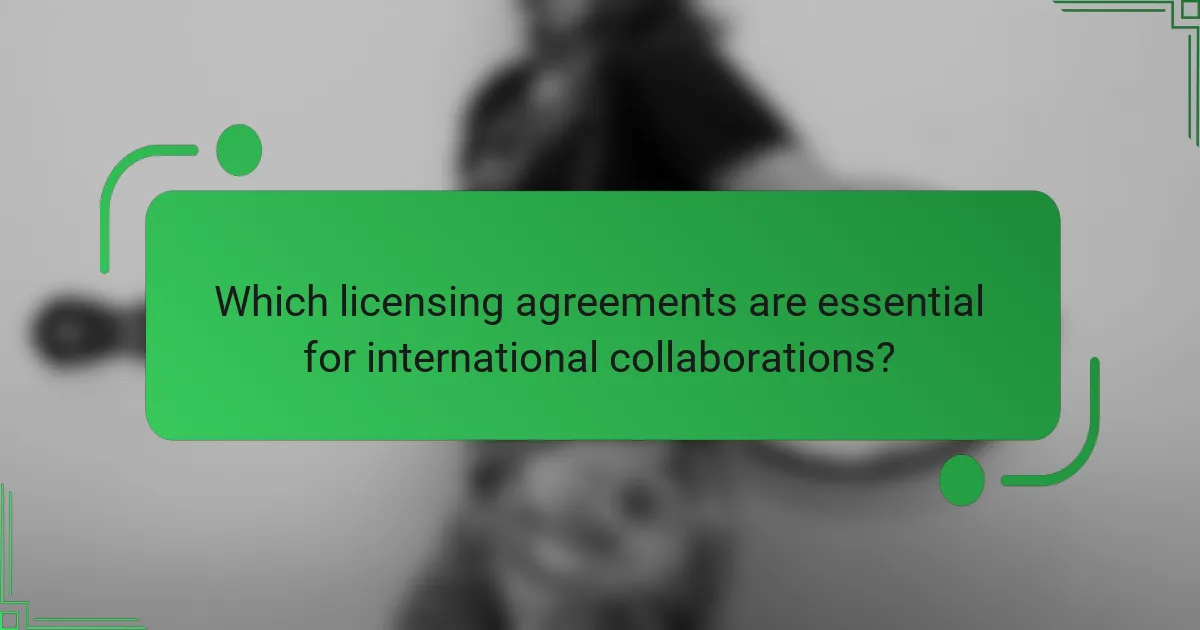
Which licensing agreements are essential for international collaborations?
Essential licensing agreements for international collaborations include synchronization licenses, mechanical licenses, and performance rights agreements. These agreements ensure that all parties involved can legally use and distribute the music across different territories.
Synchronization licenses allow the use of music in audiovisual works, while mechanical licenses cover the reproduction of music in physical formats. Performance rights agreements protect the rights of artists when their music is performed publicly. Each agreement addresses specific rights and compensation, making them crucial for successful international collaborations.
What is the role of performance rights organizations in licensing?
Performance rights organizations (PROs) play a crucial role in licensing by managing and protecting the rights of music creators. They ensure that artists receive royalties for the public performance of their works. PROs collect fees from venues, broadcasters, and digital platforms that use music, distributing the earnings to their members based on usage data. This system simplifies the licensing process for users while safeguarding the financial interests of independent musicians. By facilitating international collaborations, PROs help indie artists navigate copyright issues and legal considerations across different jurisdictions.
How do mechanical licenses work in different jurisdictions?
Mechanical licenses vary by jurisdiction, impacting how music creators collaborate internationally. In the U.S., a mechanical license allows reproduction of a song, typically obtained through organizations like the Harry Fox Agency. In the EU, similar rights exist but may involve different licensing bodies and regulations. Countries like Canada have their own unique frameworks, such as the Copyright Board, which governs mechanical licensing. Each region’s legal structure influences the ease of collaboration, requiring artists to navigate diverse copyright laws and practices. Understanding these differences is crucial for successful international indie music projects.

What are the common copyright issues faced by indie artists globally?
Indie artists face several copyright issues globally, including unauthorized use of their music, lack of proper licensing agreements, and difficulties in enforcing their rights across different jurisdictions. These challenges can hinder collaboration and distribution efforts.
Key copyright issues include:
1. Unauthorized Sampling: Using portions of songs without permission can lead to legal disputes.
2. Licensing Conflicts: Different countries have varying copyright laws, complicating international collaborations.
3. Revenue Sharing Disputes: Misunderstandings over how profits from collaborations are divided can arise.
4. Protecting Original Work: Ensuring that original compositions are registered and protected can be challenging for indie artists.
These issues highlight the need for clear agreements and understanding of copyright laws in different regions.
How can disputes over ownership be resolved in international collaborations?
Disputes over ownership in international collaborations can be resolved through clear agreements and legal frameworks. Establishing a detailed contract at the project’s outset is crucial. This contract should outline ownership rights, profit-sharing, and dispute resolution mechanisms.
Involving legal experts familiar with international copyright laws can help navigate varying regulations across countries. Mediation or arbitration can serve as effective methods for resolving conflicts, offering a less adversarial approach than litigation.
Utilizing organizations that specialize in music rights can provide additional support in managing rights and royalties, ensuring all parties are fairly represented. Engaging in open communication throughout the collaboration fosters trust and minimizes misunderstandings.
What are the risks of unauthorized use of music in different regions?
Unauthorized use of music poses significant risks, including legal penalties and financial repercussions. Different regions enforce copyright laws variably, affecting how these risks manifest. For example, in the United States, penalties can reach up to $150,000 per infringement, while in the European Union, fines and legal actions may vary by country. Additionally, unauthorized use can damage reputations and lead to loss of future collaboration opportunities. Understanding regional legal frameworks is crucial for indie artists to navigate potential copyright issues effectively.
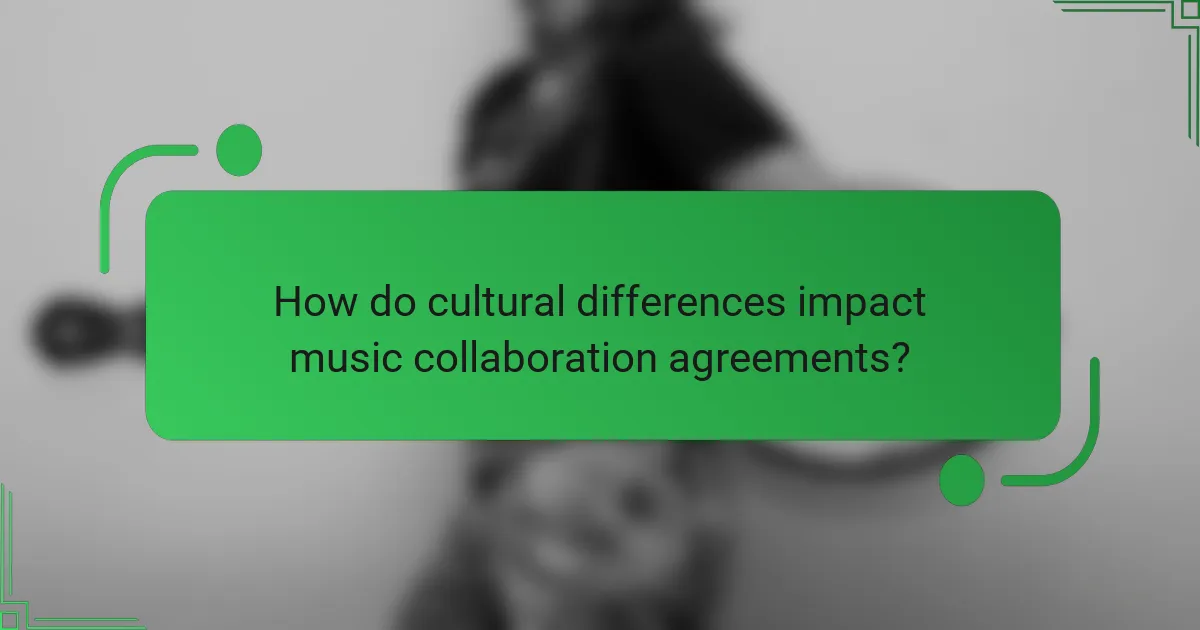
How do cultural differences impact music collaboration agreements?
Cultural differences significantly influence music collaboration agreements by shaping communication styles, negotiation tactics, and legal interpretations. These factors can affect trust levels and expectations, leading to potential misunderstandings. For instance, collectivist cultures may prioritize group consensus, while individualistic cultures may emphasize personal rights. Additionally, copyright laws vary across countries, impacting how creators protect their work. Understanding these cultural nuances is essential for successful international collaborations.
What negotiation strategies work best in diverse cultural contexts?
Effective negotiation strategies in diverse cultural contexts include building relationships, understanding cultural norms, and adapting communication styles. These approaches foster trust and facilitate smoother collaborations in international indie music projects. For example, recognizing the importance of hierarchy in some cultures can help tailor negotiation tactics. Flexibility in adapting to cultural differences enhances the likelihood of successful outcomes.
How can understanding local music markets influence collaboration success?
Understanding local music markets enhances collaboration success by fostering cultural relevance and legal compliance. Knowledge of regional trends, audience preferences, and copyright laws ensures that collaborations resonate with local audiences and adhere to legal frameworks. This understanding can lead to stronger partnerships and increased market penetration. Additionally, recognizing unique local attributes, such as specific genres or influential artists, can differentiate collaborations and create more impactful music.

What are the unique attributes of successful international indie music partnerships?
Successful international indie music partnerships often feature unique attributes such as cultural diversity, collaborative creativity, and mutual respect for artistic integrity. These partnerships thrive on shared vision and adaptability to different legal frameworks. Additionally, they frequently involve innovative distribution strategies and cross-promotion across various markets.
How do successful collaborations leverage digital platforms for exposure?
Successful collaborations leverage digital platforms to enhance visibility and reach wider audiences. These platforms facilitate networking, promote shared content, and provide tools for legal compliance in copyright management. Social media channels allow artists to showcase their work, engage with fans, and collaborate in real-time, increasing exposure significantly. Additionally, streaming services enable global distribution, allowing independent music creators to monetize their collaborations effectively.
What role does social media play in promoting international projects?
Social media significantly enhances the visibility and reach of international indie music collaborations. It allows artists to share their work globally, engage with diverse audiences, and promote their projects effectively. Through platforms like Instagram, Twitter, and TikTok, musicians can showcase their unique styles and connect with fans across borders. This online presence often leads to increased collaboration opportunities and a broader fan base. Additionally, social media facilitates real-time communication, enabling artists to navigate legal considerations and copyright issues collaboratively, ensuring compliance while maximizing creative expression.
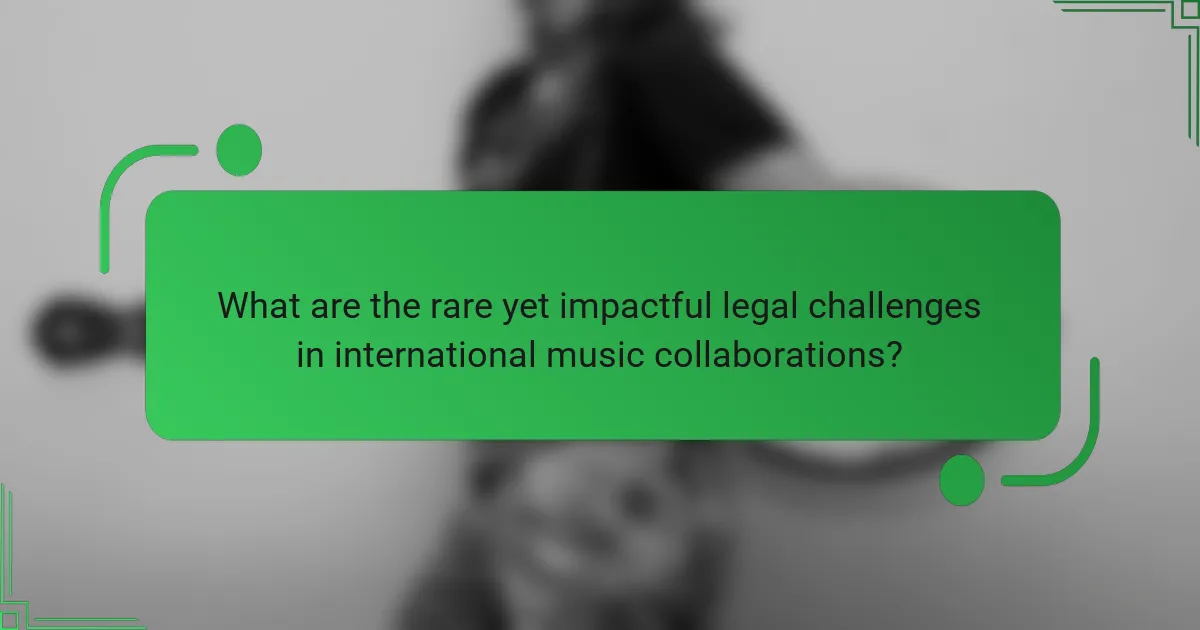
What are the rare yet impactful legal challenges in international music collaborations?
Rare legal challenges in international music collaborations include jurisdictional disputes, conflicting copyright laws, and differing moral rights. These issues can significantly impact the distribution and ownership of music. Collaborators may face complications when trying to enforce contracts across borders. Additionally, the lack of standardized agreements can lead to misunderstandings regarding revenue sharing and rights management.
How can unforeseen changes in law affect ongoing collaborations?
Unforeseen changes in law can disrupt international indie music collaborations by altering copyright protections and contractual obligations. Such changes may affect revenue sharing, distribution rights, and licensing agreements. Collaborators must stay informed about legal developments to mitigate risks. Regular legal consultations can help navigate potential challenges and ensure compliance with new regulations.
What are the implications of international treaties on music rights?
International treaties significantly impact music rights by establishing legal frameworks for copyright protection and enforcement across borders. These agreements facilitate collaboration among artists from different countries, ensuring that their rights are respected globally. For instance, the Berne Convention mandates that member states recognize the copyright of works created in other member countries. This enhances protection for indie musicians engaging in international collaborations, as it ensures their works are safeguarded against unauthorized use. Additionally, treaties often address licensing issues, helping artists navigate the complexities of royalties and distribution in foreign markets. Overall, international treaties play a crucial role in promoting fair practices in the global music industry.

What best practices should indie artists follow in international collaborations?
Indie artists should prioritize clear agreements, understand copyright laws, and maintain open communication in international collaborations. Establishing written contracts ensures all parties understand their rights and obligations. Artists must also be aware of the copyright laws in each country involved, as they can vary significantly. Regular communication helps to address any issues promptly and fosters a positive working relationship.
How can artists ensure fair compensation in cross-border projects?
Artists can ensure fair compensation in cross-border projects by establishing clear contracts and understanding local laws. They should negotiate terms upfront, including payment structures and rights management. Collaborating artists must also consider copyright laws in each relevant jurisdiction to protect their work. Utilizing professional legal advice can further safeguard their interests and ensure compliance with international standards.
What common mistakes should be avoided in international music agreements?
Avoiding common mistakes in international music agreements is crucial for successful collaborations. Key errors include neglecting to clarify ownership rights, failing to define the scope of use, overlooking local copyright laws, and not addressing dispute resolution mechanisms. Additionally, ignoring the importance of detailed contracts can lead to misunderstandings. Each of these mistakes can jeopardize the collaboration and lead to legal complications.

